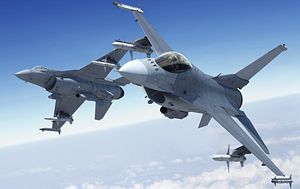U.S. defense contractor Lockheed Martin has won a $32.9 million contract modification for logistics support to the Republic of China Air Force (ROCAF) F-16 Peace Phoenix Rising program, the U.S. Department of Defense (DoD) announced on January 14.
“This modification provides for contractor logistics support, repair and return and diminishing manufacturing source management services for Taiwan F-16s Active Electronically Scanned Array Radar,” the DoD stated. “Work will be performed in Fort Worth, Texas; and Taiwan, and is expected to be complete by December 31, 2025.”
Phoenix Rising Project was launched in 2016 by Taiwan’s Ministry of National Defense and includes upgrading 142 ROCAF A/B Fighting Falcon combat aircraft to the F-16V configuration by 2023.
Approximately 25 to 28 aircraft are expected to undergo modernization each year until 2023.
Costs for the program are estimated at $4.5-$5.3 billion.
The F-16 A/Bs undergoing upgrade work will receive advanced avionics including a new flight management system, a new active electronically scanned array fire-control radar, an enhanced electronic warfare system, and a helmet-mounted display system. According to Lockheed Martin:
The core of the F-16V configuration is an Active Electronically Scanned Array (AESA) radar, a modern commercial off-the-shelf (COTS)-based avionics subsystem, a large-format, high-resolution display; and a high-volume, high-speed data bus. Operational capabilities are enhanced through a Link-16 Theater Data Link, Sniper Advanced Targeting Pod, advanced weapons, precision GPS navigation, and the Automatic Ground Collision Avoidance System (Auto GCAS).
The AESA system referred to by Lockheed Martin above is Northrop Grumman’s AN/APG-83 Scalable Agile Beam Radar. The F-16V upgrade will include the installation of the Joint Stand-off Weapon (JSOW).
The upgrade program is reportedly proceeding according to schedule.
(Taiwanese Parliamentarians raised concerns in 2019 following the revelation that Taiwan’s state-owned Aerospace Industrial Development Corp (AIDC) failed to deliver six refitted jets in the first quarter of 2019.)
The first four retrofitted F-16A/B fighters, upgraded AIDC, were handed over to ROCAF at an airbase in Chiayi county in southwestern Taiwan in October 2018.
Taiwan is also in the process of procuring an additional 66 F-16 Fighting Falcon V Block 70s.
Taiwan’s Ministry of National Defense requested the F-16 fighters from the U.S. in March 2019 to “demonstrate our determination and ability to defend ourselves,” according to the country’s Deputy Defense Minister Shen Yi-ming.
The last sale of U.S. fighter jets to Taiwan took place in 1992, under the George H.W. Bush administration.
The defense ministry is reportedly also interested in procuring the F-35B, the short take-off and vertical landing (STOVL) variant of Lockheed Martin’s supersonic fifth-generation fighter jet.

































